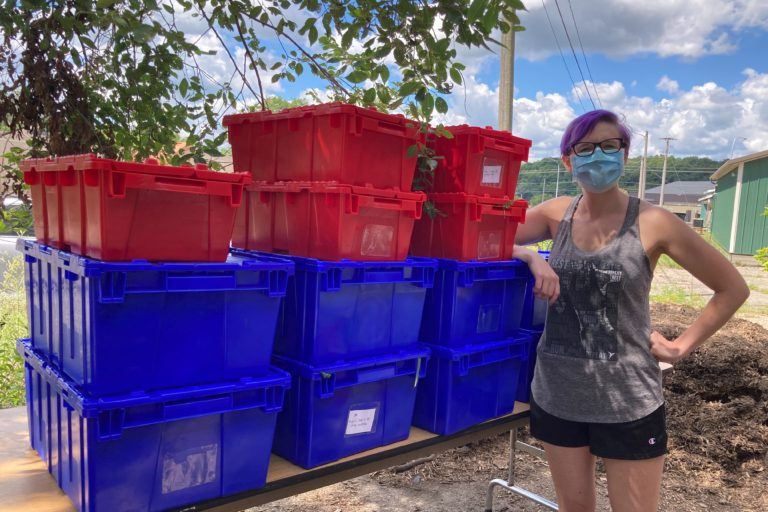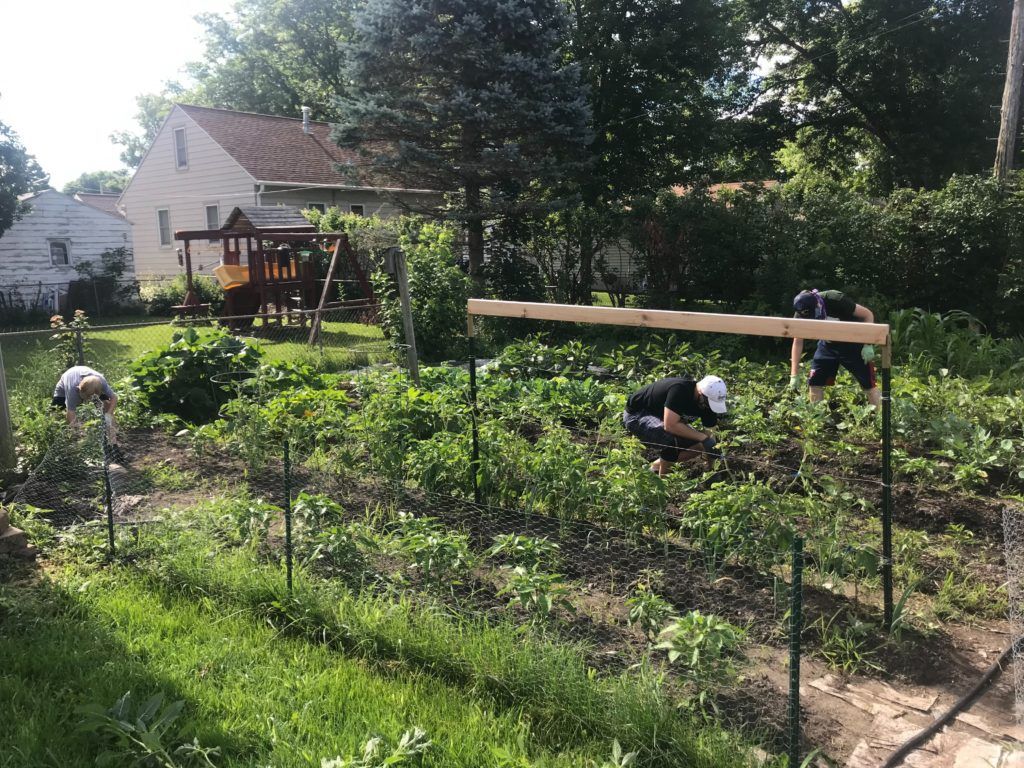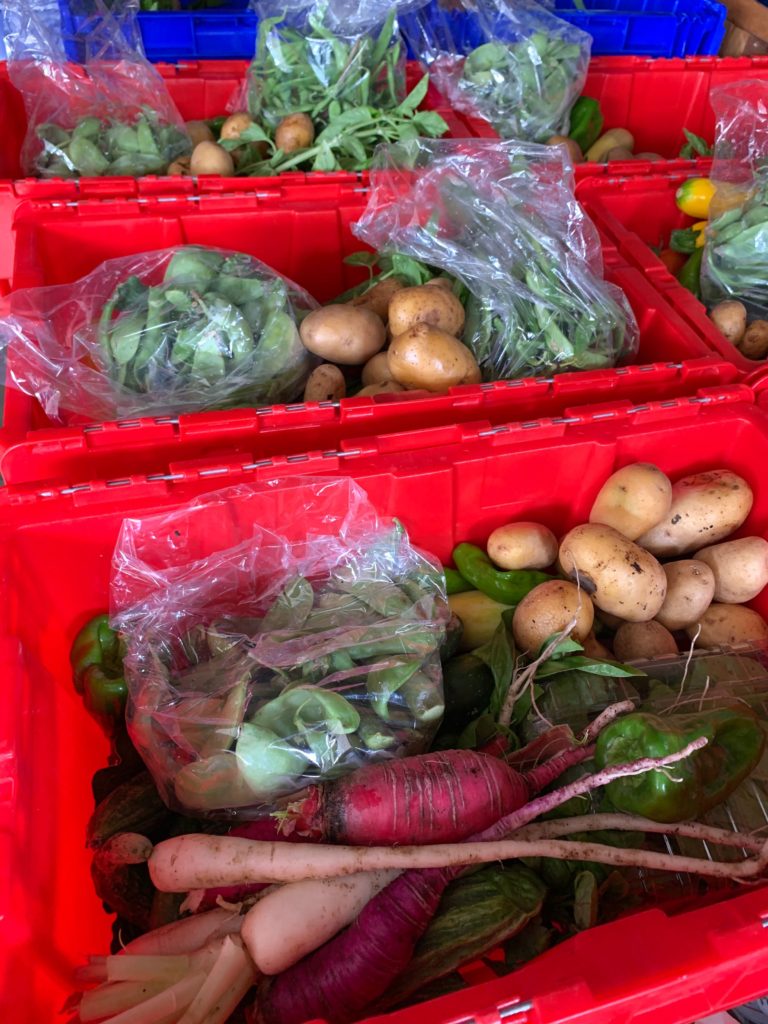Revolutionary Earth

Top photo: Susan, the President of Revolutionary Earth, with full subscriber boxes. Once you are a subscriber, Revolutionary Earth will continue to deliver to your house until you tell them to stop.
“Every organism, from our backyards to our neighbors, is satisfied. That is our goal.”
Christopher Brenna, Founder, Revolutionary Earth
Founder Christopher Brenna brought together his experiences as a professor, organizer, and activist when he created Revolutionary Earth, a nonprofit that ensures gardens in the Rochester-area produce hyper-local, organic food for the people who need it most first. Volunteers donate their backyards to be converted into gardens; the organic produce is then delivered to subscribers by Revolutionary Earth.
In 2018, Brenna had grown tired of working in academia, and wanted to make use of his skills to meet the needs of his community.
“I saw a weakness in the business of food charities,” he said. “Food shelves do a lot of good in that they feed a lot of people, but I wanted to supplement those programs to reach people who weren’t being reached.”
For example, in Rochester, the largest food shelf is located on the outskirts of town. Its location presents a challenge for those who don’t have access to public transportation, AND for a city that lacks a comprehensive transportation system.
In 2019, Revolutionary Earth began. Instead of taking on a community garden that would require transportation to the garden and the free time to tend to it, Brenna and his wife Rachel sought to answer the question: What would it be like to eliminate, or seek to eliminate, the problems of a low-income household in such a way that they don’t have to expend any other resources to have their needs met?
In short: how could they get fresh food to people who needed it most, and make sure they got it first?

Forming an Ecosystem
“We started talking about food, and what food that doesn’t create more problems looks like,” Brenna said. They also recognized they couldn’t define health for people, but they could try to create a system that got hyper-local, organic produce, something that is often expensive and inaccessible, delivered within 24 hours of being harvested.
By creating reliable access to food by using community-members’ yards, Revolutionary Earth is attempting to create a local ecosystem that both is and isn’t about food.
“Food insecurity is not a physical condition only; it is a psychological condition,” Brenna said. “It creates a lot of mental issues and consequences, especially in children. Not knowing where food will come from and not knowing what it is going to be, can cause anxiety, substance abuse, concentration issues in school…. Our subscribers are never going to have to doubt that we are going to deliver.”
In its first year, Revolutionary Earth established itself as a volunteer-led movement that values inclusiveness and empowerment. With four backyards to host gardens, 15 volunteers, and a 2000 Ford Ranger they bought for $100, they began delivering fresh produce.
“When we came back the second week, the households we’d delivered to told us they didn’t think we would come back,” Brenna said.
Brenna knew he had to seek a system that was “money proof” – a resilient system that was not susceptible to gaps in resource management. With the goal of being reliable and consistent for their subscribers, Revolutionary Earth did not seek donations in its first year — they delivered to two households at the beginning of the summer, and the number grew to 14 by late October.
During that time, Brenna started to explore fiscal sponsorship. He sought out a Minnesota company, and ended up choosing Propel for the technical support.
“Besides my Tom Sawyer ability – to see strengths in others and let them do their thing – I don’t have many skills in nonprofit management,” Brenna said. “I needed help answering the legal questions.”
With the pieces in place to grow in 2020, the organization saw over 120 volunteers, working in 18 gardens, and delivering to 43 households.
By providing the best food for the poorest first, food that isn’t for sale or offered to anyone else, Revolutionary Earth builds trust among its subscribers. Once that door is opened, they can ask, “what else do you need?”

Plans for Growth
Propel was able to support Revolutionary Earth as they navigated financial and organizational growth. For example, Propel staff helped volunteers at Revolutionary Earth navigate the legal side of attaining permits to grow their own compost – an expensive and important resource for growing organic food.
“We got permission from our county to run a pilot program – we and a few other companies can test out new solutions for composting,” Brenna said.
In late 2020, after they’d established themselves outside of Propel’s fiscal sponsorship program, they began planning to launch their fundraising program called The Alliance – a program of financial subscribers that will allow them to expand their reach, what they can deliver, and for how long.
In 2021, they are planning to reach between 60 and 75 households with 15 percent more produce, on average, in each box. Additionally, they plan to extend their season by at least three weeks and up to five, for a total of 20 weeks of delivery. Their gardens should produce between four and five tons of produce, and volunteers are planning to deliver bread, milk, and eggs for eight weeks of the season and supplement the Revolutionary Earth boxes with produce from organic farms as well.
As Revolutionary Earth continues to grow, their mission remains at the center of their work. “We empower compassionate people to transform urban waste and scarcity into an ecosystem.
“Every organism, from our backyards to our neighbors, is satisfied,” Brenna said. “That is our goal.”
To learn more about Revolutionary Earth, visit: revolutionaryearth.org, or find them at one of their free mobile pop-up farmer’s markets this summer.
